Entering the foreign exchange market requires access to trading infrastructure, pricing data, and execution mechanisms. This access is not available directly to individual traders without an intermediary. That intermediary is a forex broker, a firm or platform that connects retail clients to the global currency market. Understanding the role of a broker and why one is necessary can help beginners approach forex trading more clearly and with realistic expectations.
This article outlines what a forex broker does, how it functions within the broader financial system, and why you need one to trade currencies as a retail trader.
What Is a Forex Broker?
A forex broker is a financial services provider that offers access to the foreign exchange market through a trading platform. These brokers serve as intermediaries between retail clients and the wider network of financial institutions, such as banks, liquidity providers, and interbank markets. Without a broker, individuals would not be able to execute trades or access real-time pricing on currency pairs.
Brokers earn money primarily through transaction costs such as spreads, commissions, or a combination of both. In exchange, they supply the technical infrastructure, regulatory framework, and tools needed to open and manage trades.
Functions of a Forex Broker
To understand why a forex broker is essential, it helps to examine the specific services they provide:
1. Market Access
Individual traders cannot directly access the interbank market, which is where the largest currency transactions occur. A broker acts as a gateway, linking you to liquidity providers that quote bid and ask prices for every currency pair.
2. Price Quoting and Execution
Brokers deliver real-time price feeds to your trading terminal. When you decide to buy or sell a currency pair, the broker executes the trade on your behalf, either through a dealing desk or by routing the order to external liquidity providers, depending on the broker’s model.
3. Trading Platform and Tools
Brokers offer software interfaces for placing and managing trades. These platforms include charting tools, technical indicators, and risk management features. They also show account balances, open positions, trade history, and order types.
4. Margin and Position Management
Through the broker, you can control larger positions than your deposited capital allows by trading on margin. Brokers manage this process and maintain margin accounts to ensure exposure remains within predefined limits.
5. Regulatory Compliance
Most legitimate brokers operate under licenses from regulatory agencies. These licenses come with requirements for capital reserves, operational transparency, and client fund segregation. This structure reduces the risk of fraud and mismanagement.
Types of Forex Brokers
There are several operational models that brokers may use:
- Market Makers: These brokers often take the other side of a client’s trade. They quote prices internally and fill orders without routing them to external liquidity providers.
- ECN Brokers: ECN (Electronic Communication Network) brokers connect traders to a network of liquidity providers and match buy/sell orders from various participants.
- STP Brokers: Straight-Through Processing brokers send client orders directly to external liquidity providers without intervention.
Each type has its own cost structure, order execution speed, and pricing behavior.
Why You Cannot Trade Without a Broker
A few key reasons explain why you must go through a broker to trade currencies as a retail participant:
- No direct access to interbank pricing: The interbank market is reserved for institutions with high trading volume. Brokers aggregate pricing from these institutions and present it in retail-friendly formats.
- Lack of execution technology: Trading platforms, order matching engines, and backend systems required for live trading are highly technical and costly to build. Brokers provide this infrastructure as part of their service.
- Account security and fund handling: A broker manages account setup, order processing, deposit/withdrawal systems, and compliance with anti-money laundering policies. These functions are required before you can legally open a trade.
- Client support and technical assistance: Brokers offer support services that help resolve trade issues, funding concerns, or platform functionality problems. Without this structure, you’d have no recourse during technical disruptions.
- Licensing and legal compliance: When you open a forex broker account, the process involves regulatory identification, fund verification, and risk disclosures. These are mandated by authorities to protect retail traders and ensure lawful participation in financial markets.
Features to Look for When Selecting a Broker
While many brokers offer similar access, some key differences can affect your trading experience. When you prepare to open forex account, review these features closely:
- Regulatory license: Confirm whether the broker is licensed by a recognized regulatory body.
- Order execution model: Understand whether they operate as a market maker, ECN, or STP.
- Trading costs: Compare spreads, commissions, swap fees, and any hidden charges.
- Platform stability: Assess the responsiveness, uptime, and user interface of the trading terminal.
- Account types: Check whether the broker offers demo accounts, micro lots, or different funding tiers.
- Risk management tools: Look for stop-loss, take-profit, and margin protection features.
These elements influence cost-efficiency, trade execution quality, and the overall trading process.
Broker vs. Other Financial Intermediaries
In traditional investing, you might work with a stockbroker or financial advisor. In forex, the role of the broker is more technical and infrastructure-focused. They do not give personal financial advice or construct portfolios. Their job is to offer execution access, pricing data, and trading tools in a secure and compliant environment.
Understanding Broker Fees
Broker fees may appear in different formats. Being aware of them helps you calculate trade costs:
| Fee Type | Description |
| Spread | The difference between bid and ask prices |
| Commission | A fixed fee per trade or per volume unit |
| Swap | Overnight interest charged or paid for holding positions |
| Inactivity Fee | Charged if your account is unused for a specific period |
| Withdrawal Fee | Applied to fund transfers from your account |
Always read the broker’s pricing policy before funding your account.
Final Thoughts
A forex broker plays a foundational role in enabling retail traders to access the currency market. Without a broker, you cannot view real-time quotes, submit trades, or manage positions. The broker provides the interface, infrastructure, and regulatory oversight required for every trade to take place.
Choosing a reliable broker is one of the most important steps in your trading setup. When you decide to open forex account, you engage not just with a platform, but with a regulated financial intermediary responsible for trade execution, fund handling, and risk monitoring. Knowing how this system works gives you the clarity needed to trade with awareness and technical readiness.








